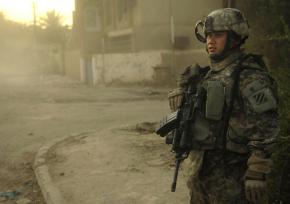Just an excuse for more wars
, a former U.S. Army Ranger and author of the forthcoming book Worth Fighting For: An Army Ranger's Journey Out of the Military and Across America, challenges the calls for the U.S. to return to Iraq and "get the job done right."
MOSUL AND other cities in northern Iraq have fallen after a stunning offensive by Sunni insurgents--and now some in the U.S. are trying to use the memory of soldiers who died during the U.S. invasion and occupation as an excuse for intervening again.
The militants may not be able to march on Baghdad, but Iraqi Prime Minister Nuri al-Maliki's government is danger of being toppled, one way or another. Maliki has begged Barack Obama to authorize air strikes against the insurgents, and Obama is said to be considering this and other action after dispatching 275 soldiers back to Iraq--two and a half years after all U.S. troops were withdrawn.
With the administration contemplating its next move, major media outlets are invoking the "the memory of our fallen soldiers" to soften a war-weary U.S. population for a possible re-entry into Iraq.
For example, USA Today asked veterans who fought in the Iraq War how they felt about the defeats for the Iraqi government.
"For me, it's very upsetting," said Nick Cook, who did two tours as an Army troop commander. "I watch what's happening there. My first six months, it was very intense fighting in Baghdad, but then there was prosperity and good news. And to see that now on the verge of collapse, and knowing I lost five soldiers, it's very hard. These kids may have died in vain."

Matthew Sinsigalli, who was part of the initial invasion of Iraq in March 2003, told the Wall Street Journal: "For [Iraqi soldiers] to just drop and flee, that's disheartening to see after all the effort put into it when we were over there."
HAVING WATCHED friends die and living with the unnatural horror of killing is a terrible fate for soldiers. Cook's and Sinsigalli's feelings may be understandable, but they get the facts of the war wrong--and they could be used to help make the way for more horrors.
We have to be vigilant against the media's use of veterans' personal and emotional appeals to build a sentiment in favor of "going back in there to get the job done right this time." We can't let them use the memory of fallen soldiers to create more fallen soldiers.
For one thing, remember that the first Sunni militias in Iraq were formed to fight the U.S. occupation, whose policies, at least initially, disproportionately affected the Sunni minority, which had been the social base of Saddam Hussein's regime. The violence and injustice of the occupation gave rise to armed resistance.
More recently, Maliki's Shia-dominated government--generally backed by the U.S., despite some frictions--has taken over the repression, ruling with a iron fist. To take one example, on April 23, 44 people were killed after army and police, including SWAT forces reportedly answering directly to Maliki, sprayed bullets at up to 1,000 demonstrators in a protest camp in the Sunni village of Hawija.
In response to a nonviolent protest campaign among Sunnis, the Maliki government has resorted to mass arrests, torture, forced confessions and murder, according to reports. Meanwhile, Sunnis have largely been excluded from participation in the new Iraqi government--starting under the American occupation and continuing through the period after U.S. troop withdrawal.
Thus, as Ashley Smith explained at SocialistWorker.org, the Sunni insurgency didn't come from nowhere, but has been ongoing for years, and has escalated in recent months.
Nick Cook's claim that there was "prosperity and good news" in Iraq from six months after the invasion is a gross distortion of what actually took place.
Once an developing industrial nation, Iraq has been devastated by a quarter century of U.S. warfare--both military and economic, in the form of sanctions. Very little of the promised U.S. aid to rebuild the economic and social infrastructure destroyed by war and sanctions ever materialized.
Instead, the top priority of the U.S. occupation was to maintain control over the government and economy, especially the oil industry. When it looked like, in the mid-2000s, that the Sunni and Shia resistance to U.S. forces might unite, the U.S. resorted to a divide-and-conquer strategy of pitting Iraqis against one another, in a civil war that took the lives of 1,000 people a month and led millions of Iraqis to flee their homes.
Not really "good news" at all.
THE TOTAL The total cost of the Iraq war has been estimated at $2.2 trillion, and some people think that figure is low. Meanwhile, the U.S. Department of Education's discretionary budget is just under $70 billion--$2.2 trillion could have doubled the amount the federal government spends on education for 30 years. It could have paid for 10 million homes worth $200,000 for people who are homeless or living in substandard housing.
Among the U.S. soldiers who are now being used as the pretext to call for intervention, the war in Iraq caused 4,500 troop deaths and 320,000 veterans with traumatic brain injuries. On the Iraqi side, the conservative estimate is 650,000 civilian deaths.
Clearly, the U.S. military-industrial complex is out of control and incompetent. It claims to fight for democracy, but backs tyrants. It spends obscene amounts of money on reckless and deadly wars. And it bars any objective media coverage in its wars.
Every mission conducted by the U.S. military need to be relentlessly questioned. There needs to be large protests against current and future military actions to prevent the U.S. from intervening in any more countries. But this will be made all the more difficult if we allow ourselves to be manipulated by a government and media that invoke the memoru of dead soldiers to justify more war.


